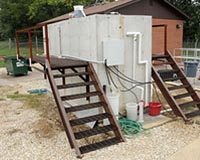| . |  |
. |
Abidjan (AFP) Sept 21, 2009 Organisations representing tens of thousands of victims of toxic waste dumped in Ivory Coast on Monday gave a mixed welcome to a 33 million euro payment announced in London by oil trading firm Trafigura. Claude Gohourou, president of the Ivorian national coordination of toxic waste victims, said that the payments provided "moral comfort" and added that in this case, "a bad arrangement is better than a good trial." Gohourou told AFP that Trafigura's settlement, announced out of court on Sunday, had "come after two years after our complaints, which means that we avoid going into a judicial procedure with uncertain results for the future." But another representative of the victims, Denis Yao Pipira, protested that in the settlement, Trafigura refused to accept responsibility for deaths and serious sickness and called for "new negotiations". Ivory Coast has said the dumping in 2006 killed 17 people and caused more than 100,000 to seek medical help. Trafigura late Saturday agreed to pay 30 million pounds (33 million euros, 49 million dollars) to victims of the waste dumped in Abidjan, a spokesman for the firm said Sunday. Each victim, among 31,000 claimants, will get 750,000 francs CFA (1,150 euros, 1,700 dollars), the spokesman added. In August 2006, the Probo Koala ship, chartered by Trafigura, dumped caustic soda and petroleum residues on city waste tips across Abidjan -- having first attempted to offload the cargo in Amsterdam. A report by a UN expert last week found "strong" evidence linking the waste to 15 deaths and several hospitalisations. Okechukwu Ibeanu, who is the UN special rapporteur on the issue, said there was "a strong basis to conclude that the deaths and illnesses were directly and indirectly linked to the dumping waste". Trafigura has always disputed this, however, and its position was upheld in the out-of-court settlement, which ended legal proceedings against Trafigura in Britain. A High Court case was due to have begun on October 6. The agreement with British lawyers Leigh Day and Company, who represent the 31,000 claimants in Abidjan, accepts that there is no link between exposure to the waste and any deaths or miscarriages, as was alleged. Pipira, who heads a national federation of victims of toxic waste in Ivory Coast, told a press conference on Monday that the weekend settlement should be renegotiated. "Trafigura wants victims to sign untruthful declarations stating that the waste didn't cause any (serious) casualties and that there were just a few superficial injuries," Pipira charged. Last week, Pipira said that the forthcoming settlement was an "admission of guilt" which would bring "moral comfort to the victims". Trafigura has already paid one hundred billion CFA francs (152 million euros) in damages to the victims in an out-of-court deal with the Ivory Coast government, which exempted it from legal proceedings in that country. Share This Article With Planet Earth
Related Links Our Polluted World and Cleaning It Up
 Self-Contained Wastewater System For Small Towns And Soldiers
Self-Contained Wastewater System For Small Towns And SoldiersRolla MO (SPX) Sep 21, 2009 Cheaper. Better. Faster. Most people will say you can't have all three. But don't tell that to Dr. Jianmin Wang, a professor of civil, architectural and environmental engineering at Missouri University of Science and Technology. Wang has created a wastewater system "in a box." Each system, built by re-purposing a shipping container, is low power, low maintenance and highly efficient. ... read more |
|
| The content herein, unless otherwise known to be public domain, are Copyright 1995-2009 - SpaceDaily. AFP and UPI Wire Stories are copyright Agence France-Presse and United Press International. ESA Portal Reports are copyright European Space Agency. All NASA sourced material is public domain. Additional copyrights may apply in whole or part to other bona fide parties. Advertising does not imply endorsement,agreement or approval of any opinions, statements or information provided by SpaceDaily on any Web page published or hosted by SpaceDaily. Privacy Statement |